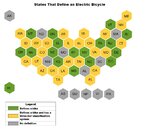D
Deleted member 4210
Guest
Traveling this year with your new ebike to other states ? Want to know quickly, which 25 have the 3-tiered ebike classification system ? Or which wants don't ? Or which ones actually define what an ebike is ? Or which of the states still live in the dark ages, and don't define an ebike whatsoever ?
Well here is your go-to link before you hit the open road, either in your RV, your SUV, or MAYBE just actually go across state lines on your EBIKE ONLY sans any other vehicle ....
....
https://www.ncsl.org/research/transportation/state-electric-bicycle-laws-a-legislative-primer.aspx
Well here is your go-to link before you hit the open road, either in your RV, your SUV, or MAYBE just actually go across state lines on your EBIKE ONLY sans any other vehicle
https://www.ncsl.org/research/transportation/state-electric-bicycle-laws-a-legislative-primer.aspx



